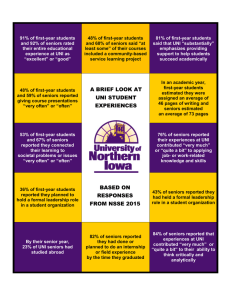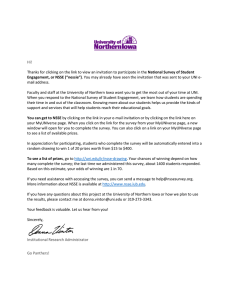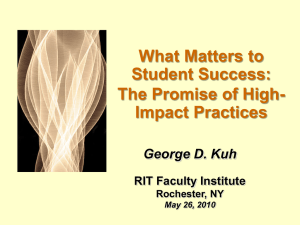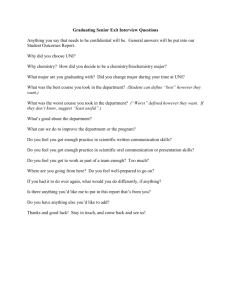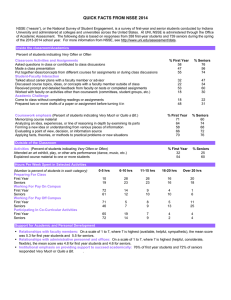Assessment of Learning in the Liberal Arts Core Donna Vinton, Ph.D.
advertisement
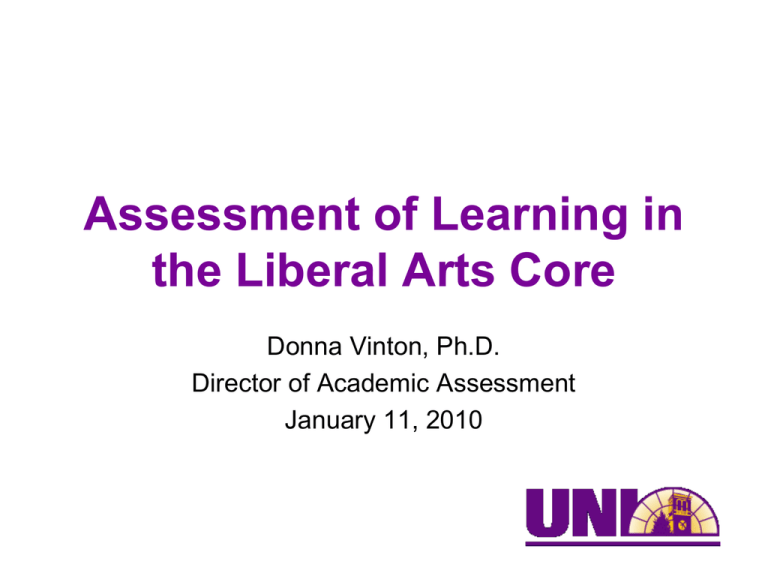
Assessment of Learning in the Liberal Arts Core Donna Vinton, Ph.D. Director of Academic Assessment January 11, 2010 Topics for Today • Background on LAC assessment at UNI • 2008-2009 assessment data for the LAC • Questions for next steps LAC Assessment: Some Background 2000: NCA re-accreditation team recommended improvement in student outcomes assessment processes related to the LAC 2001: LAC Committee formed a subcommittee to develop a comprehensive student outcomes assessment program for the LAC 2002: Pilot testing of Academic Profile and the Collegiate Assessment of Academic Proficiency/Critical Thinking. 2004: • The LAC Assessment Subcommittee decided to use Academic Profile for LAC assessment. (This instrument was later renamed Measure of Academic Proficiency and Progress and, more recently, Proficiency Profile.) • Initial results of testing with Academic Profile were shared with the President and his cabinet, the Provost and Academic Affairs Council, and the Faculty Senate • NCA Progress Report on the General Education Program was submitted to the North Central Association and approved. 2005-6: • First year to administer NSSE 2007-8 • First use of Oral Communication sections to administer MAPP to first-year students 2008-9 • NSSE & MAPP data placed on password-protected page on the Academic Assessment web site • Workshops on LAC data offered on campus 2009-2010 • Presentations on NSSE and MAPP data at department faculty meetings 3 Key Measures of Learning • National Survey of Student Engagement (NSSE) This instrument replaced College Student Experience Questionnaire, or CSEQ, named in the original plan. • Graduating Senior Survey from UNI Office of Institutional Research • Measure of Academic Proficiency and Progress (MAPP, now known as Proficiency Profile and formerly called Academic Profile) Two Types of Data • Student perceptions (indirect measures) – NSSE – Graduating Senior Survey • Standardized testing (direct measure) – Measure of Academic Proficiency and Progress NSSE Survey Content Student Behaviors in College Institutional Actions And Requirements Student Reactions to College Student Background Information Student Learning & Development Data From NSSE • Responses for individual survey items by response stems and item mean • Calculated mean for 5 “benchmark” areas: level of academic challenge, active and collaborative learning, enriching educational experiences, student-faculty interaction, supportive campus environment • Comparison of UNI data with data from selected cohort groups (e.g., UNI peers, Carnegie peers, Foundations of Excellence institutions) • Additional data from consortium questions—American Democracy Project and Consortium for the Study of College Writing MAPP MAPP, or the Proficiency Profile measures: • proficiency in critical thinking, reading, writing and mathematics in the context of humanities, social sciences and natural sciences • academic skills developed, versus subject knowledge taught, in general education courses Source: http://www.ets.org/mapp, highlights added MAPP: Norm-Referenced Scores Norm-referenced scores (scaled scores) compare the scores of one student or group of students to another. Eight norm-referenced scores: • Total Score • Skills subscores (critical thinking, reading, writing and mathematics) • Context subscores (humanities, social sciences and natural sciences) UNI scores in each of these areas can be compared to scores of students in comparable (Master’s I and II) institutions. MAPP: Criterion-Based Scores Criterion-referenced scores (proficiency classifications) measure the level of proficiency obtained on a certain skill set. Nine criterion-referenced scores: • Mathematics (Level 1, Level 2, Level 3) • Writing (Level 1, Level 2, Level 3) • Reading (Level 1, Level 2, Critical Thinking) UNI scores in each of these areas can be compared to scores of students in comparable (Master’s I and II) institutions. Uses of MAPP/NSSE Data at UNI • Assessment of learning in the Liberal Arts Core • Key performance indicators for the Student Affairs Division http://www.uni.edu/studentaffairs/documents/Student%20Affairs%20Units %20KPIs%205-27-09.pdf • Foundations of Excellence (study of the first-year at UNI) • Academic Advising assessment plan • Voluntary System of Accountability College Portrait http://www.collegeportraits.org/IA/UNI 2008-9 Assessment Data For the Liberal Arts Core Tips for Viewing the Data Slides • Focus on the types of data available for now; examine specific data later. • Think about potential goals for student performance and how we can/should go about setting such goals. • Identify areas that are most important—to you, your department, the university. • Consider what particular data sets might imply for the LAC and for curricula and performance in academic majors—in terms of courses, assignments, pedagogy, grading, etc. • Ask what additional data might be needed and how/with whom to share the data to put it to use most effectively. Creating an Assessment Plan • Determine learning outcomes • Describe learning outcomes in terms of specific behaviors • Identify assessment strategies/instruments to provide data related to learning outcomes • Analyze and use the resulting data • Evaluate/revise assessment strategies The LAC Assessment Plan • Assessment of learning in the LAC Categories conducted through the Category Review process • Assessment of student learning related to five overall areas of skill represented in the Liberal Arts Core: o o o o o Communication Information Thinking Interpersonal Quantitative Communication Students should be able to speak, listen, read, write, and view effectively, adapting appropriately to the audience and material at hand. Speaking Effectively Graduating Senior Survey Rate how well UNI has prepared you for speaking effectively (Q1) Excellent Good Average Fair Poor Cannot evaluate 30.3 54.0 12.7 1.9 0.5 0.6 Speaking Effectively, continued NSSE 11d. To what extent has your experience at this institution contributed to your knowledge, skills, and personal development in speaking clearly and effectively? Year Very Much Quite a Bit Some Very Little First-Year 28% 47% 22% 3% Seniors 29% 45% 20% 6% Listening Effectively Graduating Senior Survey Rate how well UNI has prepared you for listening effectively (Q 4) Excellent Good Average Fair Poor Cannot evaluate 38.3% 48.7% 11.0% 1.4% 0.4% 0.2% Writing Effectively Graduating Senior Survey Rate how well UNI has prepared you for communicating through writing (Q2) Excellent Good Average Fair Poor Cannot evaluate 36.1% 52.3% 9.3% 1.7% 0.2% 0.4% Writing Effectively, continued NSSE 11c. To what extent has your experience at this institution contributed to your knowledge, skills, and personal development in writing clearly and effectively? Year Very Much Quite a Bit Some Very Little First-Year 29% 48% 18% 4% Seniors 31% 45% 21% 4% Writing Effectively, continued MAPP Norm-referenced subscore for writing Possible range: 100-130 Year Mean Score 25th percentile 50th percentile 75th percentile First-Year 113.72 111 114 117 Seniors 115.55 113 116 117 Writing Effectively, continued MAPP Proficiency classifications for writing 2008-9 UNI scores compared to scores from ETS testing in Master’s I and II institutions, 2003-2007 Skill Year Proficient Marginal Not Proficient UNI ETS UNI ETS UNI ETS Writing, Level 1 First-year 54% 55% 31% 29% 14% 15% Seniors 67% 71% 27% 21% 6% 8% Writing, Level 2 First-year 13% 12% 34% 33% 53% 55% Seniors 24% 22% 34% 40% 42% 38% Writing, Level 3 First-year 4% 5% 19% 21% 77% 75% Seniors 9% 9% 23% 32% 68% 59% Information Students should be able to use both traditional sources and modern technologies to access, analyze, and manage information. Information Graduating Senior Survey Rate how well UNI has prepared you for: Excellent Good Average Fair Poor Cannot evaluate Understanding written communication. (Q3) 33.0% 52.1 % 11.9 % 1.9 % 0.5 % 0.6 % Learning new things (Q11) 44.9% 44.1% 9.7% 0.9% 0.2% 0.2% Bringing info/ ideas together from different areas (Q13) 36.8% 48.3% 12.2% 1.9% 0.4% 0.5% Using research skills (Q14) 37.0% 45.6% 13.9% 2.7% 0.5% 0.4% Information, continued NSSE 11g. To what extent has your experience at this institution contributed to your knowledge, skills, and personal development in using computing and information technology? Year Very Much Quite a Bit Some Very Little First-Year 28% 47% 22% 4% Seniors 38% 41% 19% 3% Information, continued NSSE 11j. To what extent has your experience at this institution contributed to your knowledge, skills, and personal development in the area of learning effectively on your own? Year Very Much Quite a Bit Some Very Little First-Year 29% 48% 19% 4% Seniors 27% 48% 20% 5% Thinking Students should be able to address complex issues and problem situations with sound reasoning, reflective judgment, creative imagination, and a critical, analytical bent of mind. Thinking Graduating Senior Survey Rate how well UNI has prepared you for: Excellent Good Average Fair Poor Cannot evaluate Defining problems (Q9) 30.6% 50.3% 16.7% 1.6% 0.3% 0.5% Solving problems (Q10) 33.6% 51.2% 13.3% 1.2% 0.3% 0.4% Thinking 38.3% creatively (Q12) 44.7% 13.5% 2.4% 0.8% 0.2% Making decisions (Q19) 48.5% 10.5% 0.7% 0.3% 0.2% 39.8% Thinking, continued NSSE 11e. To what extent has your experience at this institution contributed to your knowledge, skills, and personal development in the area of thinking critically and analytically? Year Very Much Quite a Bit Some Very Little First-Year 37% 44% 17% 2% Seniors 45% 42% 11% 2% Thinking, continued NSSE 11m. To what extent has your experience at this institution contributed to your knowledge, skills, and personal development in the area of solving complex real-world problems? Year Very Much Quite a Bit Some Very Little First-Year 20% 38% 35% 7% Seniors 19% 40% 31% 10% Thinking, continued MAPP Norm-referenced subscore for critical thinking Possible range: 100-130 Year Mean Score 25th percentile 50th percentile 75th percentile First-Year 110.42 106 109 114 Seniors 113.60 109 113 118 Thinking, continued MAPP Proficiency classifications for writing 2008-9 UNI scores compared to scores from ETS testing in Master’s I and II institutions, 2003-2007 Skill Year Proficient Marginal Not Proficient UNI ETS UNI ETS UNI ETS Reading, Level 1 First-year 51% 52% 24% 25% 26% 23% Seniors 66% 72% 20% 17% 14% 11% Reading, Level 2 First-year 25% 22% 17% 19% 59% 59% Seniors 39% 41% 19% 21% 42% 38% Reading, Level 3 (Critical Thinking) First-year 3% 2% 11% 8% 86% 90% Seniors 9% 6% 15% 17% 76% 77% Interpersonal Students should understand human emotions, motivations, and idiosyncrasies, and be able to participate effectively in relationships, groups, and citizenship activities. Interpersonal: Understand human emotions, motivations, and idiosyncrasies Graduating Senior Survey Rate how well UNI has prepared you for: Excellent Good Average Fair Poor Cannot evaluate Working with people of diverse backgrounds (Q21) 40.4% 36.5% 16.7% 4.1% 1.7% 0.6% Working as a team (Q22) 44.5% 42.8% 11.2% 0.7% 0.7% 0.2% Leading others(Q23) 40.6% 42.1% 14.3% 2.0% 0.5% 0.4% Interpersonal, continued: Understand human emotions, motivations, and idiosyncrasies NSSE 11h. To what extent has your experience at this institution contributed to your knowledge, skills, and personal development in working effectively with others? Year Very Much Quite a Bit Some Very Little First-Year 33% 42% 23% 2% Seniors 41% 43% 13% 3% Interpersonal: Participate Effectively in Relationships, Groups, and Citizenship Activities Graduating Senior Survey Rate how well UNI has prepared you for: Excellent Good Average Fair Poor Cannot evaluate Planning projects (Q8) 32.9% 46.9% 15.4% 3.4% 0.5% 0.9% Conducting yourself in a professional manner (Q15) 49.6% 40.2% 8.3% 1.1% 0.3% 0.5% Upholding ethical standards (Q16) 45.2% 41.8% 10.8% 0.9% 0.6% 0.6% Interpersonal, continued: Participate Effectively in Relationships, Groups, and Citizenship Activities Graduating Senior Survey Rate how well UNI has prepared you for: Excellent Good Average Fair Poor Cannot evaluate 39.4% 45.2% 13.6% 1.1% 0.3% 0.4% Working under 45.8% pressure ((Q18) 43.4% 9.3% 1.1% 0.2% 0.2% Working independently (Q20) 42.4% 9.0% 0.6% 0.3% 0.2% Adapting to change (Q17) 47.6% Interpersonal, continued: Participate Effectively in Relationships, Groups, and Citizenship Activities NSSE 11i. To what extent has your experience at this institution contributed to your knowledge, skills, and personal development in voting in local, state, or national elections? Year Very Much Quite a Bit Some Very Little First-Year 29% 30% 30% 11% Seniors 16% 25% 32% 28% Interpersonal, continued: Participate Effectively in Relationships, Groups, and Citizenship Activities NSSE 11l. To what extent has your experience at this institution contributed to your knowledge, skills, and personal development in understanding people of other racial and ethnic backgrounds? Year Very Much Quite a Bit Some Very Little First-Year 18% 27% 43% 11% Seniors 18% 33% 36% 12% Interpersonal, continued: Participate Effectively in Relationships, Groups, and Citizenship Activities NSSE 11n. To what extent has your experience at this institution contributed to your knowledge, skills, and personal development in developing a personal code of values and ethics? Year Very Much Quite a Bit Some Very Little First-Year 24% 32% 35% 9% Seniors 22% 37% 28% 13% Interpersonal, continued: Participate Effectively in Relationships, Groups, and Citizenship Activities NSSE 11o. To what extent has your experience at this institution contributed to your knowledge, skills, and personal development in contributing to the welfare of your community? Year Very Much Quite a Bit Some Very Little First-Year 14% 27% 38% 20% Seniors 14% 31% 39% 16% Interpersonal, continued: Participate Effectively in Relationships, Groups, and Citizenship Activities NSSE/American Democracy Project Consortium 16a. I believe my coursework is preparing me to participate in politics (e.g., voting, volunteering or contributing to a campaign, or persuading others about a candidate or political issue). Year Strongly Agree Agree Disagree Strongly Disagree First-Year 5% 44% 43% 8% Seniors 6% 35% 46% 13% Interpersonal, continued: Participate Effectively in Relationships, Groups, and Citizenship Activities NSSE/American Democracy Project Consortium 16b. I believe my coursework is preparing me to discuss politics and government with my friends and family. Year Strongly Agree Agree Disagree Strongly Disagree First-Year 14% 53% 26% 8% Seniors 17% 53% 24% 6% Interpersonal, continued: Participate Effectively in Relationships, Groups, and Citizenship Activities NSSE 11h. To what extent has your experience at this institution contributed to your knowledge, skills, and personal development in working effectively with others? Year Very Much Quite a Bit Some Very Little First-Year 33% 42% 23% 2% Seniors 41% 43% 13% 3% Quantitative Students should be able to make effective use of quantitative data, and to intelligently apply relevant mathematical and statistical concepts and methods on appropriate occasions. Quantitative Graduating Senior Survey Rate how well UNI has prepared you for making basic calculations and computations (Q6) Excellent Good Average Fair Poor Cannot evaluate 32.4% 41.5% 18.9% 4.7% 0.6% 1.8% Quantitative, continued NSSE 11f. To what extent has your experience at this institution contributed to your knowledge, skills, and personal development in analyzing quantitative problems? Year Very Much Quite a Bit Some Very Little First-Year 28% 44% 25% 3% Seniors 30% 45% 21% 4% Quantitative MAPP Norm-referenced subscore for mathematics Possible range: 100-130 Year Mean Score 25th percentile 50th percentile 75th percentile First-Year 113.14 109 112 117 Seniors 115.62 112 114 120 Quantitative, continued MAPP Proficiency classifications for writing 2008-9 UNI scores compared to scores from ETS testing in Master’s I and II institutions, 2003-2007 Skill Year Proficient Marginal Not Proficient UNI ETS UNI ETS UNI ETS Mathematics, Level 1 First-year 45% 47% 27% 29% 27% 24% Seniors 63% 58% 27% 26% 10% 16% Mathematics, Level 2 First-year 20% 20% 26% 27% 54% 53% Seniors 33% 30% 30% 29% 37% 41% Mathematics, Level 3 First-year 6% 4% 11% 12% 82% 84% Seniors 13% 8% 14% 18% 73% 74% Humanities MAPP Norm-referenced subscore for humanities Possible range: 100-130 Year Mean Score 25th percentile 50th percentile 75th percentile First-Year 113.56 109 113 118 Seniors 117.03 112 117 121 Social Sciences MAPP Norm-referenced subscore for social sciences Possible range: 100-130 Year Mean Score 25th percentile 50th percentile 75th percentile First-Year 112.78 107 112 117 Seniors 115.38 110 117 121 Natural Sciences MAPP Norm-referenced subscore for natural sciences Possible range: 100-130 Year Mean Score 25th percentile 50th percentile 75th percentile First-Year 114.05 110 113 118 Seniors 115.98 112 117 121 Final Thoughts Evaluating the LAC Graduating Senior Survey Indicate the extent to which you agree or disagree with the following statements. Strongly Agree Agree Disagree Strongly Disagree Not Sure Overall quality of most LAC courses is excellent 14.6% 58.5% 14.5% 3.1% 9.3% The purposes of most LAC courses are very clear 14.9% 52.8% 19.5% 4.2% 8.7% Most of the LAC courses I took at UNI were intellectually demanding. 14.1% 55.6% 19.0% 4.0% 7.3% I believe the LAC has been an important part of my education. 18.2% 50.9% 17.5% 5.4% 8.1% Evaluating the LAC, continued NSSE 11a. To what extent has your experience at this institution contributed to your knowledge, skills, and personal development in acquiring a broad general education? Year Very Much Quite a Bit Some Very Little First-Year 44% 40% 14% 2% Seniors 45% 39% 14% 2% Evaluating the LAC, continued NSSE 13. How would you evaluate your entire educational experience at this institution? Year Excellent Good Fair Poor First-Year 41% 50% 9% 1% Seniors 41% 49% 8% 1% Next Steps: Some Questions • How can the data we have be put to use? • What additional data/evidence of learning would we like to have, and how can we collect it? • How will revision of the LAC affect assessment strategies? • Do we want longitudinal data, and if so, how can we test enough students to gather the necessary data? • The sample size for seniors is small (57-123 per year for 2007 through 2009). How can we increase it? • How do we increase student motivation to complete tests and surveys and do their best on them? Thank you! Questions/thoughts?
